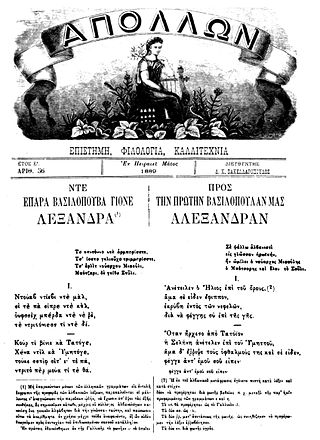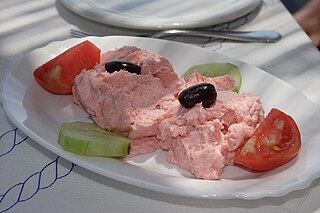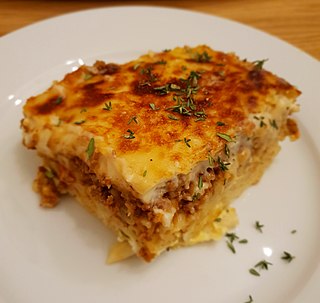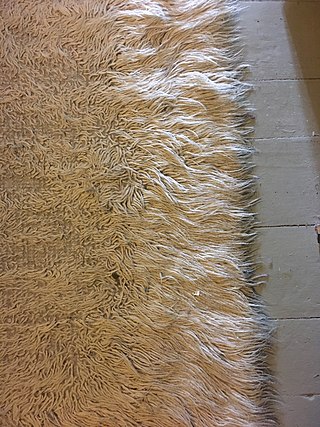
Arvanitika, also known as Arvanitic, is the variety of Albanian traditionally spoken by the Arvanites, a population group in Greece. Arvanitika was brought to southern Greece during the late Middle Ages by Albanian settlers who moved south from their homeland in present-day Albania in several waves. The dialect preserves elements of medieval Albanian, while also being significantly influenced by the Greek language. Arvanitika is today endangered, as its speakers have been shifting to the use of Greek and most younger members of the community no longer speak it.

Souvlaki is a Greek fast food consisting of small pieces of meat and sometimes vegetables grilled on a skewer. It is usually eaten straight off the skewer while still hot. It can be served with or inside a rolled pita, typically with lemon, sauces, vegetables such as sliced tomato and onion, and fried potatoes as a side. The meat usually used in Greece and Cyprus is pork.
Ouzo is a dry anise-flavored aperitif that is widely consumed in Greece. It is made from rectified spirits that have undergone a process of distillation and flavoring. Its taste is similar to other anise liquors like pastis, sambuca, mastika, rakı, and arak.
The oka, okka, or oke was an Ottoman measure of mass, equal to 400 dirhems. Its value varied, but it was standardized in the late empire as 1.2829 kilograms. 'Oka' is the most usual spelling today; 'oke' was the usual contemporary English spelling; 'okka' is the modern Turkish spelling, and is usually used in academic work about the Ottoman Empire.

Pastrami is a type of cured meat originating from Romania usually made from beef brisket. The raw meat is brined, partially dried, seasoned with herbs and spices, then smoked and steamed. Like corned beef, pastrami was created as a way to preserve meat before the invention of refrigeration. One of the iconic meats of Eastern European cuisine as well as American Jewish cuisine and New York City cuisine, hot pastrami is typically served at delicatessen restaurants on sandwiches such as the pastrami on rye.

The Duden is a dictionary of the Standard High German language, first published by Konrad Duden in 1880, and later by Bibliographisches Institut GmbH, which was merged into Cornelsen Verlag in 2022.

Taramasalata or taramosalata is a meze made from tarama, the salted and cured roe of the cod, carp, or grey mullet (bottarga) mixed with olive oil, lemon juice, and a starchy base of bread or potatoes, or sometimes almonds. Variants may include garlic, spring onions, or peppers, or vinegar instead of lemon juice. While not traditionally Greek, smoked rather than cured cod's roe is more widely available in some places, and often used. Bottarga is usually much more expensive than cod's roe.

In Greek cuisine, saganaki is any one of a variety of dishes prepared in a small frying pan, the best-known being an appetizer of fried cheese. It is commonly flambéed in North America.
Malakas is a commonly used profane Greek slang word, with a variety of different meanings, but literally meaning "man who masturbates". While it is typically used as an insult, with its literal equivalent in Commonwealth English being "wanker” and “jerk off” in American English, the meaning varies depending on the tone and context used. It can be an exclamation of pleasure, an expression of dark horror, a cry of anger, a declaration of affection, and other different things. Common alternative meanings include "asshole", "motherfucker" "jerk" or "idiot", and the contrasting "dude", or "mate", depending on the context. It has been described as "the most used Greek slang word".

Pastitsio is a Greek baked pasta dish with ground meat and béchamel sauce, with variations of the dish found in other countries near the Mediterranean Sea.

An etymological dictionary discusses the etymology of the words listed. Often, large dictionaries, such as the Oxford English Dictionary and Webster's, will contain some etymological information, without aspiring to focus on etymology.

Tamyneoi is a former municipality of the island of Euboea, Greece. Since the 2011 local government reform it is part of the municipality Kymi-Aliveri, of which it is a municipal unit. The municipal unit has an area of 203.971 km2. The seat of the municipality was in Aliveri. The name reflects that of the ancient city of Tamynae.
Mantinada, plural mantinades (μαντινάδες) is the art of musical declamation (recitative) in form of a narrative or dialogue, sung in the rhythm of accompanying music. It is prominent in several parts of Greece, especially on the island of Crete where mantinades are performed in accompaniment of the Cretan lyra and Cretan laouto . The word is derived from Venetian matinada, meaning "morning song".

A flokati rug is a woven wool rug. They are shaggy in appearance, and are thick and soft. Modern wool or synthetic rugs may be purchased in a variety of colours.

Emmanuel G. Kriaras was a Greek lexicographer, philologist, professor and linguist. He was Professor Emeritus of the School of Philosophy at the Aristotle University of Thessaloniki. He was a student of Jean Psychari and the practice and ideology of demotic Greek.

Lapa or lapas is a kind of rice porridge or gruel eaten in the Balkans, Levant, and Middle East. It is made of just rice, water, and salt and has the consistency of a thick soup.

Georgios Babiniotis is a Greek linguist and philologist and former Minister of Education and Religious Affairs of Greece. He previously served as rector of Athens University. As a linguist, he is best known as the author of a Dictionary of Modern Greek, which was published in 1998.
The Dictionary of Modern Greek, more commonly known as Babiniotis Dictionary, is a well-known dictionary of Modern Greek published in Greece by Lexicology Centre and supervised by Greek linguist Georgios Babiniotis.
The following tables compare Ancient Greek dictionaries, in any language.
The Sgouros, also known as Sgouropoulos (Σγουρόπουλος), Sgouromallaios (Σγουρομαλλαίος), Sgouranos (Σγουρανός), Sgouris (Σγουρής), Sgourismenos (Σγουρισμένος), Sgouritzis (Σγουρίτζης), and Sgourogiannis (Σγουρογιάννης), was a Byzantine Greek noble family – composed of multiple branches – that originated from Nafplio.













